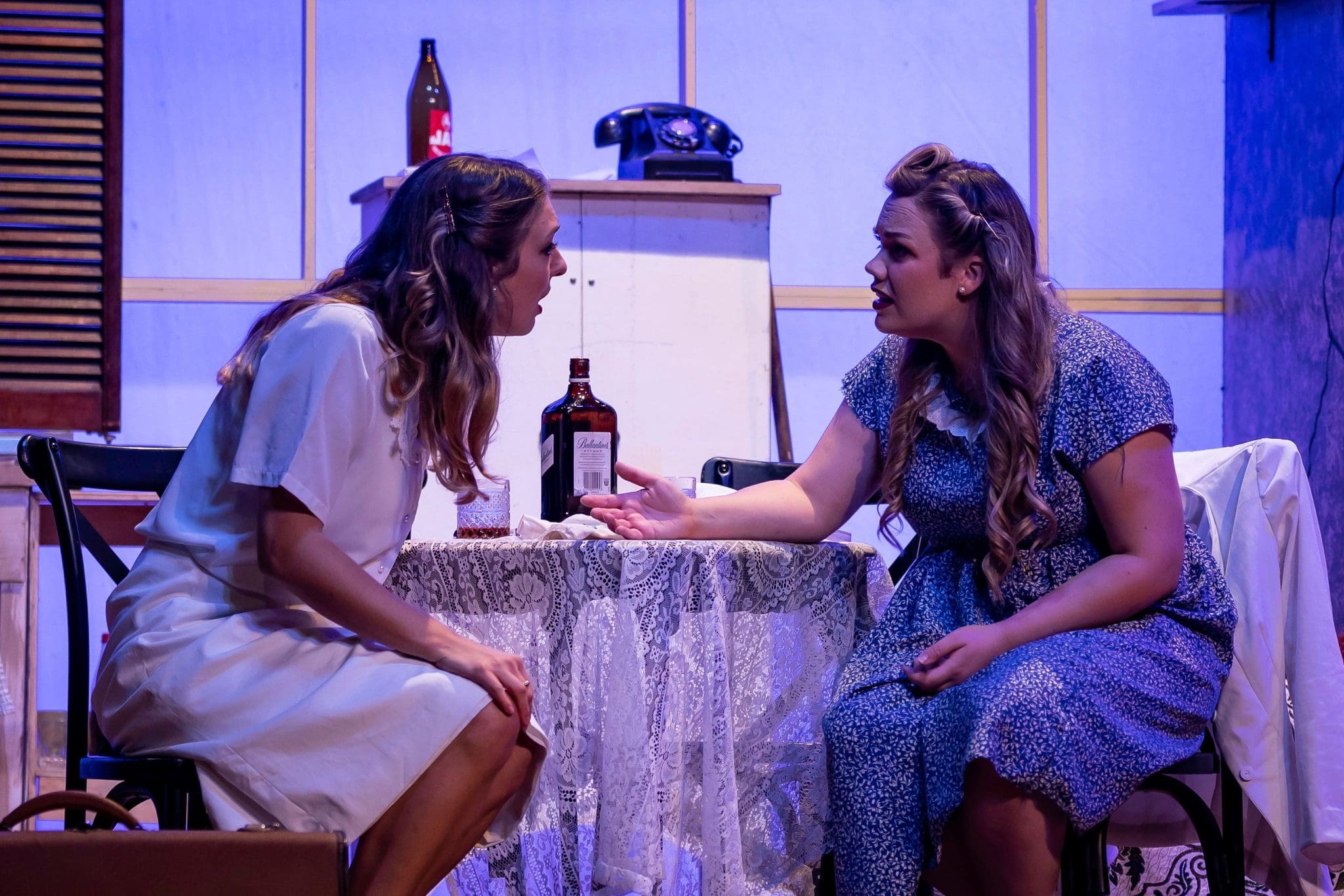A Streetcar Named Desire, written by Tennessee Williams, is an extremely difficult play to pull off. The show follows Blanche DuBois, a school teacher who seeks help from her sister as she tries to cope with her unfortunate loss of land and financial issues. The play explores themes of domestic violence and sexual assault, as the audience watches Blanche’s fall from grace. The Directors, Tony Massey and Meg Girdler, did an amazing job setting the scene before the play even began. The Genesian Theatre is very small, with only seven rows of stalls and a small upper circle. With this, the setup of the stage was also pretty small, so there weren’t any setting changes. It had what it needed to be a good production, especially for such a small theatre.
Through the use of 50’s style music, and utilising a few of the actors chatting on stage while the audience was finding their seats, an enticing ambience and foundation for the rest of the show was set. A huge amount of credit must go to the crew for the smooth transitions between acts. With each change in act, the lights turned into a dim blue, allowing the audience to continue to see the actors move around. The directions in which they changed positioning continued to stay in line with the plot and the actors stayed in character the whole way through. There was no point in the play where there was any confusion regarding who the characters were, where the scenes were set, or the thematic context.
Riley McNamara (Stanley Kowalski) deserves an immense amount of recognition for a tremendous job in portraying the harsh reality of an abuser, evoking many intense emotions and bringing on teary eyes from those in the audience. Through his subtle detailing in tone use, actions, facial expressions, and body language, McNamara built a lot of depth for his character. It was difficult not to feel intimidated by his character, even while sitting in the stalls. Ali Bendall’s (Stella Kowalski — Stanley’s pregnant wife) performance combats the intricacies of presenting a heartbreaking role of being subjected to an abusive relationship. Bendall leant into the ideology of fantasy versus reality, and how this is typically present within an abusive environment. The way Bendall was able to convey the contradicting emotions and thoughts surrounding her abusive husband allowed the audience to have an insight into the fear and anger, yet sheer love, that her character had for her husband. I felt a lot of pity for Stella’s character, and almost felt very protective over her. Her pure denial of her husband’s abusive tendencies shone through, and it almost hurt me to know that she couldn’t leave without help from others — and that she didn’t want to. There are many aspects of her character that touched my heart, and that I see in myself and many of my female friends.
Following the intense, potentially triggering nature of the relationship between Stanley and Stella, there were two distinctive performers that provided some comedic relief. Rosie Daly (Eunice Hubbel) and Patrick Gallagher (Steve Hubbel), though they also portrayed a relationship with abusive tendencies, were able to add an essence of comedy in a very tasteful way. Having comedic touches within a play with such heavy topics was an essential element that both the director and the actors had successfully worked on. Finally, it is impossible to leave out both Georgia Britt (Blanche DuBois) and Matthew Doherty (Harold Mitchell, ‘Mitch’). Britt’s performance was outstanding from the moment she entered the stage to the moment she stepped back behind the curtains. Her energy was extremely captivating, and her acting skills were immaculate. She was able to successfully portray a wide range of emotions whilst keeping up with the humorous personality of her character throughout the first half of the show. Her character wasn’t the most likeable at the beginning of the show, with an attitude of superiority and high maintenance. I grew more fond of her as the play progressed, when she showed her caring and loving tendencies in the progression of her relationship with Mitch. She had amazing chemistry with Doherty, and they complimented each other very well. Doherty’s acting elucidated exactly how I thought his character would be in reality; a gentleman with a good heart and sensitivity, alongside a need for support from Blanche.
This production was excellent. The actors worked extremely well together, and every single one of them portrayed their characters almost perfectly. The direction and production of the play was very well done, especially for such a limited stage space in the Genesian Theatre. This production team, crew, and cast did an amazing job with this show, and it was thoroughly enjoyed by the audience!
A Streetcar Named Desire will be performed at the Genesian Theatre until May 7.





